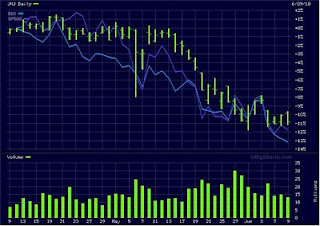The medical device sector has been one that has seen some severe multiple compression in recent years where, instead of paying close to 20x earnings for a steady 10% annual growth rate, now the market seems content to only pay 12-14x earnings. The result is that these stocks have been cruelly punished to the point where they are looking nearly criminally cheap. Even in a time of normal interest rates it makes sense to buy stock in a company trading at 20x earnings with a 10% annual growth rate provided that it also has some dividend yield. At 3-4% interest rates when these companies are still reliably delivering strong profit growth these companies look quite cheap. Specifically, I am speaking of:
Medtronic (MDT)
Johnson and Johnson (JNJ)
Zimmer Holdings (ZMH)
One thing I like about all of these compared to pharmaceutical companies is that they are not as subject to patent risk. Medical devices are far harder to produce "generics" for as not just any mom and pop manufacturing firm can whip together pacemakers or spinal implants. Even if they did, the liabilities would be tremendous. That's not as true with generic drugs. Once you know how to do the chemical formula, it's fairly simple. Of course, I am speaking as someone who didn't do too well in chemistry, but empirically speaking this seems to be true. These companies do periodically get hit with government probes and lawsuits, but rarely have they gone anywhere.
I personally own Medtronic and it has been a source of frustration as it has delivered on its earnings growth targets, but it has seen its PE multiple shrink down to the point it now trades at 9.8x next year's forecast earnings. That's absurd for a company growing 10% a year. It once traded at close to 23x earnings when I first bought it. Similarly, Johnson and Johnson trading at 11.4x next year's earnings is also very cheap, especially as it pays a 3.6% dividend even if it doesn't go anywhere. I'll take 3.6% given that ten year treasuries give so less. Zimmer trades at 11.8x next year's earnings with a growth rate even higher than JNJ or Medtronic. Its downfall is that it doesn't pay a dividend.
If I had to recommend only one of these, I would say JNJ is the best bet for a core position. That dividend yield on top of 8-10% annual earnings growth is hard to say no to. Also, it has more diverse product lines, though medical devices provided the real oomph to the growth rate. Still, the diversity does insulate it from being hamstrung by a liability issue in any one product line.
In all of this you will note that I did not mention Boston Scientific (BSX). This is for good reason. That stock is garbage and it only brings sadness and woe to all who own it. Leave it alone to fester and decay in the pits of stock hell.
Disclaimer
Opinions and observations expressed on this blog reflect the authors' individual experiences and should not be construed to be financial advice. None of the members of this blog are licensed financial advisors. Please consult your own licensed financial advisor if you wish to act on any recommendations here.
Showing posts with label JNJ. Show all posts
Showing posts with label JNJ. Show all posts
Monday, July 12, 2010
Wednesday, June 9, 2010
When bad things happen to good stocks
Why do bad things happen to good people? I can't really answer that one and frankly it isn't a very interesting question. Now, why do good stocks become slaughtered for no reason? That's a question that's worth asking.
Case in point Johnson and Johnson (JNJ) and Becton Dickinson (BDX). These are both good healthcare stocks with low multiples (compared to their historic norms) and good projected growth rates. They have also been utterly annihilated (relatively speaking) in the recent market sell-off. In fact, they are even being sold off as badly or worse than the broad market. Why? There really isn't a good rationale. The market is just very lousy at the moment:
If you have been looking for some good core positions that you would like to be on sale, this isn't a bad place to look. Really bad markets such as this do have their good points. 2000-2002 and 2007-2009 had more than their fair share of these opportunities.
Case in point Johnson and Johnson (JNJ) and Becton Dickinson (BDX). These are both good healthcare stocks with low multiples (compared to their historic norms) and good projected growth rates. They have also been utterly annihilated (relatively speaking) in the recent market sell-off. In fact, they are even being sold off as badly or worse than the broad market. Why? There really isn't a good rationale. The market is just very lousy at the moment:
If you have been looking for some good core positions that you would like to be on sale, this isn't a bad place to look. Really bad markets such as this do have their good points. 2000-2002 and 2007-2009 had more than their fair share of these opportunities.
Subscribe to:
Posts (Atom)
